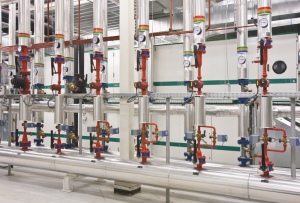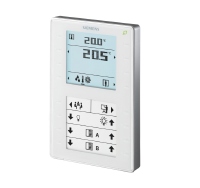Talking sense about sensors

While it can be tempting to save cost on a controls project by choosing cheaper peripherals, Ian Ellis of Siemens Building Technologies warns of the higher long-term costs that will result.
The pursuit of cost savings on a construction project all too often focuses on the initial price of an item, no matter how comparatively small. But a long-term view will serve the client better, because good-quality peripherals are vital to the operation of the building energy management system (BEMS).
Peripherals sending inaccurate signals or not responding accurately to the BEMS can result in long-term energy inefficiency. Good-quality peripherals also avoid the additional problems of costly repairs and replacements further down the line.
In spite of these points, peripheral equipment in building controls often attracts the gaze of the contractor or client holding the cost sheet and looking for capital-cost savings. Focusing on sensors, actuators, valves and dampers as areas for saving on initial outlay may seem like a good option. However, these seemingly small items can hold the key to long-term savings if quality is considered when the choice is made.
The first clue about the quality of a peripheral is the type of information that is supplied with it. In the case of sensor accuracy, care should be taken to ensure figures quoted on datasheets illustrate the whole range of the sensor, rather than just one point.
Our product manager Andy Davis explains: ‘This is a very difficult area and one which causes confusion and can be misleading. Some manufacturers may just show the accuracy at the “sweet spot”, giving an unrealistic picture of the overall accuracy. We also ensure our diagrams show the accuracy across the range of the sensor. So at 20°C accuracy is maybe ±0.5 K, but that accuracy will change with the temperature, which is to be expected, and will be different for different types of sensor.
 |
| Without reliable information from sensors, the control of HVAC plant will be compromised. |
‘With just a single accuracy at, say, 20°C on the datasheets, consultants, specifiers or installers might assume this accuracy is true for the whole range, which is unlikely.’
And taking the accuracy of the sensor in isolation is also a pitfall to avoid. The entire control loop’s accuracy can be impacted by a different sensor being used, as well as having an impact on certification.
Andy Davis explains: ‘Our Desigo RXB range of controllers is certified to AA levels with Eubac (the European Building Automation & Controls Association) ensuring they are genuinely energy efficient.
‘The Eubac certification is not simply for the controller, but the whole loop of controller, room unit and valve. So if a different room unit is used then the certification is no longer valid and control accuracy of the loop can’t be guaranteed.’
Therefore, for the best energy-efficient control, all the control elements used during Eubac certification should be used in the loop. A different room unit installed to save costs may use additional energy and in the medium to long term could add significant energy costs to a building.
Another sign of quality peripherals is the amount of testing they undergo. High levels of testing mean that it is far more likely that every sensor out of the box works identically or that valves deliver the same performance or damper actuators can be positioned accurately. Testing is the mark of a robust and reliable performance from the peripherals.
 |
| These units combine sensor and controller in a wall-mounted unit for parameters such as temperature, CO2 and humidity. |
These are costs not often considered when the case of quality versus price is being balanced at the start of a project, but forward-thinking contractors will see the long-term value of investment in testing, which means that they are not called in to replace equipment that has failed on-site. This can mean business disruption for building occupants as well as manpower costs for the contractor.
Steve Tomlinson, our product manager for valves and actuators, explains: ‘We have a test laboratory where we put valves through a lifetime of operations (100 000 to 200 000) in a short space of time to ensure they can perform and that the actuators can cope with that sort of load.
Of course, we are all aware that every penny spent in our commercial buildings has to be justified in terms of its payback, and building controls are no different. Fortunately, there is a British and European standard that can help identify potential energy savings that result from investment in controls.
‘BS EN 15232 Energy performance of buildings. Impact of building automation, controls and building management’ should be a document that anyone involved in controls specification has to hand. The standard is also recommended in the Part L (2013) Non-Domestic Compliance Guide.
The standard shows how different types and level of building controls affect the long-term energy efficiency of a building. If a client is thinking about how to justify the extra cost of good quality peripherals, then BS EN 15232 can offer some real insights into that.
Andy Davis says: ‘The standard demonstrates how energy efficient a controller and its loop are, so it is an excellent way to look at costs beyond the capital investment. Sensor accuracy is very important, but the standard offers a view of the building energy management system as a whole — and what it can save in terms of energy and costs.’
Ian Ellis is marketing manager with Siemens Building Technologies.







